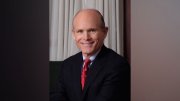Thomas J. Hollister, Harvard’s vice president for finance and chief financial officer since 2015, announced today that he would step down at the end of the academic year, next June 30. His decision, following the recent news that the deans of divinity and of public health would also conclude their service, signals the changing of the guard that often accompanies the renewal of the University’s senior leadership at a time of presidential transition: Lawrence S. Bacow is departing Mass Hall next June, too.
In his Harvard capacity, Hollister may be best known for his yearly letter, with University treasurer Paul J. Finnegan, introducing the University’s annual financial report. It has, during his tenure, carefully balanced the financial essentials with a focus on their purpose: supporting the institution’s academic mission. Their message in the 2022 report, for example, celebrates current financial strengths, warns about the perils of high inflation and a pending recession (as finance professionals are wont to do), but concludes by focusing on the promising future:
As we emerge from the pandemic that left our campus empty for so long, we recognize that—incredibly and admirably—it did not impede our community from carrying on in the fulfillment of the University’s mission. Instead, the experience has unleashed new energy, new approaches, and new paths to help chart the roadmap to Harvard’s future. With a strong financial foundation and agile planning, the University is well positioned to manage through both future opportunities and challenges.
Hollister oversaw a comprehensive restructuring of Harvard’s borrowings, taking advantage of the period of low interest rates that ended this past spring to substantially reduce debt-service costs—a benefit that will extend for decades, saving the institution hundreds of millions of dollars. At the end of the past decade, he and his colleagues planned in advance for an inevitable future recession—and so put the entire University on guard for the financial shocks introduced in March 2020 when the nascent pandemic shuttered the campus and raised the prospect of staggering losses. In the event, the expense disciplines put into place quickly; timely borrowing of reserve funds in case of need (at extremely favorable interest rates); and the effects of pivoting to online instruction and safely restarting research while campus-based teaching, residence costs, and travel were curtailed yielded a series of increasingly large surpluses, culminating in the $406-million surplus reported for the fiscal year ended last June 30. The accumulated operating surpluses of more than $900 million during the three pandemic years represent a significant reserve for deans to invest in future academic initiatives—or as an equally large cushion against deteriorating national and global economic conditions. Either way, they represent a major part of the strong financial legacy the Bacow administration will be able to bequeath to his successor.
Hollister is also a member of the Harvard Management Company board of directors. A multiyear review of the University’s financial and liquidity needs and risk tolerance, in which he was very involved and which concluded a year ago, has resulted in an agreement between Harvard and the management company about what level of risk to assume in investing endowment assets. That agreement, involving a slightly higher level of risk (more equity investments), is trebly significant. First, it represents the sort of understanding between University operations and investment management that simply has to be in place, given that endowment distributions are by far the largest source of funds for the annual budget: teaching and research. Second, it reflects the putting to bed of the financial traumas that followed the University’s enormous investment and related losses (totaling some $14 billion) during the financial crisis and Great Recession from 2008 to 2010, which forced the endowment managers to be more risk-averse for much of the ensuing decade. Third, it puts the endowment on a firmer path toward enhanced returns, which are of course the foundation of Harvard’s financial model.
Alongside that improvement in University-endowment operations, Hollister was keenly interested in, and a champion of, another aspect of Harvard’s educational and financial operations: the rapid growth in professional and continuing education, which are now approximately the same size, in revenue, as all degree programs. He saw those programs’ growth into a half-billion-dollar business (pre-pandemic) as a source of enhanced, and stable, revenues, and as a way to extend the teaching mission far beyond campus.
In those ways and others, Hollister played a larger than customary role as CFO. He also devoted more time and energy than many people in his position to explaining Harvard’s opaque finances to interested audiences—embodying the place’s educational mission in his own definition of his responsibilities. Not a bad run for the person whose job titularly has to do with balancing the books.
Executive vice president Meredith Weenick is organizing the search for a successor.
Read the University announcement here.









